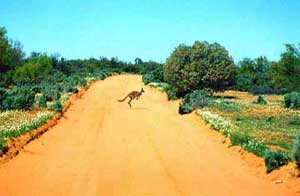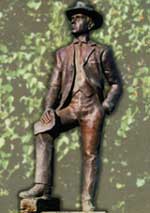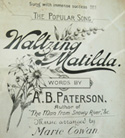
Poetry
 |
Outback
The Poet
Henry Lawson is often called "The People's Poet". He was born in 1867, raised in country NSW and moved to Sydney in his late teens. He was politically aware and his writings exposed both social injustice and life in the bush. He spent a year or so travelling the outback after he had been criticised for having no actual experience on which to base his writings.
The poem "Out Back" graphically depicts the life of a swagman during the depression of the 1890's. Men walked from homestead to homestead hoping for either a feed or work - often shearing sheep or working in the shearing shed. Sometimes there was simply not enough work to go around.
The Poem
The old year went, and the new returned, in the withering weeks of drought;
The cheque was spent that the shearer earned, and the sheds were all cut out;
The publican's words were short and few, and the publican's looks were black-
And the time had come, as the shearer knew, to carry his swag Out Back.
For time means tucker, and tramp you must, where the scrubs and plains are wide,
With seldom a track that a man can trust, or a mountain peak to guide;
All day long in the dust and heat- when summer is on the track-
With stinted stomachs and blistered feet, they carry their swags Out Back.
He tramped away from the shanty there, when the days were long and hot,
With never a soul to know or care if he died on the track or not.
The poor of the city have friends in woe, no matter how much they lack,
But only God and the swagman know how a poor man fares Out Back.
He begged his way on the parched Paroo and the Warrego tracks once more,
And lived like a dog, as the swagmen do, til the western station shore;
But men were many, and sheds were full, for work in the town was slack-
The traveller never got hands in wool, though he tramped for a year Out Back.
In stifling noons when his back was wrung by its load, and the air seemed dead,
And the water warmed in the bag that hung to his aching arm like lead.
For in times of flood, when plains were seas and the scrubs were cold and black,
He ploughed in mud to his trembling knees, and paid for his sins Out Back.
And dirty and careless and old he wore, as his lamp of hope grew dim;
He tramped for years, til the swag he bore seemed part of himself to him.
As a bullock drags in the sandy ruts, he followed the dreary track,
With never a thought but to reach the huts when the sun went down Out Back.
He chanced one day when the north wind blew in his face like a burnace-breath.
He left the track for a tank he knew- twas a shorter cut to death;
For the bed of the tank was hard and dry, and crossed with many a crack.
And, oh! it's a terrible thing to die of thirst in the scrub Out Back.
A drover came, but the fringe of law was eastward many a mile:
He never reported the thing he saw, for it was not worth his while.
The tanks are full, and the grass is high in the mulga off the track,
Where the bleaching bones of a white man lie by his mouldering swag Out Back.
For time means tucker, and tramp they must, where the plains and scrubs are wide,
With seldom a track that a man can trust, or a mountain peak to guide;
All day long in the flies and heat the men of the outside track,
With stinted stomachs and blistered feet, must carry their swags Out Back.
Waltzing Matilda
The History
In 1895 the writer Andrew Barton (Banjo) Paterson was visiting Western Queensland staying with the Rileys of Vindex Station near Winton. Paterson and his fiance, Sarah Riley, went to visit Bob and Christina MacPherson at Dagworth Station, the scene of one of the tumultuous events of the ongoing shearers strike - the burning of Dagworth woolshed.
While at Dagworth, Paterson wrote words to a tune that Christina had played to him on an autoharp. The tune was adopted from the band March "Bonnie Wood of Craigielea".
Embedded in the verses of the song were new slang words and phrases Paterson had picked up in the area ( to 'waltz matilda') and pieces of tales he had heard (of a wool scourer who had drowned in a waterhole; of striking union shearers; and of a mystery surrounding the death of a shearer).
Waltzing Matilda was first performed publicly at the North Gregory Hotel in Winton in 1895. It was instant success that soon swept across Australia, becoming the favourite song of Australian troops fighting in the 1915 Gallipoli campaign.
The Song
Once a jolly swagman camped by a billabong,
Under the shade of a coolibah tree,
And he sang as he watched and waited 'til his billy boiled
"Who'll come a-waltzing, Matilda, with me?"Waltzing Matilda, Waltzing Matilda
Who'll come a-waltzing, Matilda, with me
And he sang as he watched and waited 'til his billy boiled,
"Who'll come a-waltzing, Matilda, with me?"Along came a jumbuck to drink at the billabong,
Up jumped the swagman and grabbed him with glee,
And he sang as he stowed that jumbuck in his tucker bag,
"You'll come a-waltzing, Matilda, with me".Waltzing Matilda, Waltzing Matilda
Who'll come a-waltzing, Matilda, with me
And he sang as he watched and waited 'til his billy boiled,
"Who'll come a-waltzing, Matilda, with me?".
Up rode the squatter, mounted on his thoroughbred,
Down came the troopers, one, two, three,
"Whose is that jumbuck you've got in your tucker bag?"
"You'll come a-waltzing, Matilda, with me".Waltzing Matilda, Waltzing Matilda
Who'll come a-waltzing, Matilda, with me
And he sang as he watched and waited 'til his billy boiled,
"Who'll come a-waltzing, Matilda, with me?".Up jumped the swagman, leapt into the billabong,
"You'll never catch me alive," said he,
And his ghost may be heard as you pass by the billabong,
"Who'll come a-waltzing, Matilda, with me".Waltzing Matilda, Waltzing Matilda
Who'll come a-waltzing, Matilda, with me
And he sang as he watched and waited 'til his billy boiled,
"Who'll come a-waltzing, Matilda, with me?"Glossary
Swagman - a drifter, a hobo, an itinerant shearer who carried all his belongings wrapped up in a blanket or cloth called a swag.
Billabong - a waterhole near a river
Coolibah - a eucalyptus tree
Billy- a tin can with a wire handle used to boil water in
Jumbuck - a sheepTucker Bag - a bag for keeping food in
Squatter - a wealthy landowner.Trooper - a policeman, a mounted militia-man.
Click on the image to hear one version of the famous song about a homeless man who steals a sheep, gets cornered by the cops and jumps into the waterhole and drowns.


